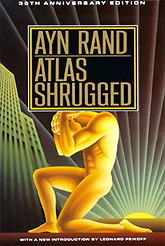The Wall Street Journal | by Yaron Brook | Mar. 14, 2009
Ayn Rand died more than a quarter of a century ago, yet her name appears regularly in discussions of our current economic turmoil. …her magnum opus, “Atlas Shrugged,” is selling at a faster rate today than at any time during its 51-year history.
There’s a reason. In “Atlas,” Rand tells the story of the U.S. economy crumbling under the weight of crushing government interventions and regulations. Meanwhile, blaming greed and the free market, Washington responds with more controls that only deepen the crisis. Sound familiar?

The novel’s eerily prophetic nature is no coincidence. “If you understand the dominant philosophy of a society,” Rand wrote elsewhere in “Capitalism: The Unknown Ideal,” “you can predict its course.” Economic crises and runaway government power grabs don’t just happen by themselves; they are the product of the philosophical ideas prevalent in a society — particularly its dominant moral ideas.
Why do we accept the budget-busting costs of a welfare state? Because it implements the moral ideal of self-sacrifice to the needy. Why do so few protest the endless regulatory burdens placed on businessmen? Because businessmen are pursuing their self-interest, which we have been taught is dangerous and immoral. Why did the government go on a crusade to promote “affordable housing,” which meant forcing banks to make loans to unqualified home buyers? Because we believe people need to be homeowners, whether or not they can afford to pay for houses.
The message is always the same: “Selfishness is evil; sacrifice for the needs of others is good.” But Rand said this message is wrong — selfishness, rather than being evil, is a virtue. By this she did not mean exploiting others à la Bernie Madoff. Selfishness — that is, concern with one’s genuine, long-range interest — she wrote, required a man to think, to produce, and to prosper by trading with others voluntarily to mutual benefit.
Rand also noted that only an ethic of rational selfishness can justify the pursuit of profit that is the basis of capitalism — and that so long as self-interest is tainted by moral suspicion, the profit motive will continue to take the rap for every imaginable (or imagined) social ill and economic disaster. Just look how our present crisis has been attributed to the free market instead of government intervention — and how proposed solutions inevitably involve yet more government intervention to rein in the pursuit of self-interest.
Rand offered us a way out — to fight for a morality of rational self-interest, and for capitalism, the system which is its expression. And that is the source of her relevance today.
. . . more


This post caught my eye because the book Atlas Shrugged was on my “books to read” list and I noted next to it that it falls under the theme of dystopia, along with the book Farenheit 451. You’ve piqued my interest in the topic so I’ll be sure to read these next so I can comment more thoughtfully on the subject!